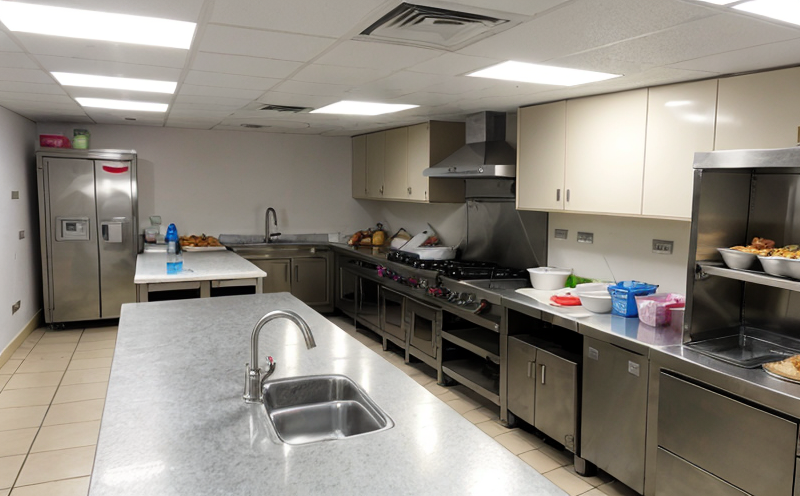Food hygiene audit inspection
The food hygiene audit inspection is a critical process ensuring compliance with regulatory standards and best practices in the food industry. This service focuses on assessing the cleanliness, safety, and proper handling of food products to prevent contamination and ensure hygienic conditions throughout the production chain.
During an audit, we evaluate various aspects including personnel hygiene, environmental sanitation, raw material storage, processing methods, packaging procedures, and waste management systems. Compliance with international standards such as ISO 22000:2018, HACCP (Hazard Analysis and Critical Control Points), and EU legislation is paramount.
The audit process involves multiple stages. Initially, we review the facility's documentation and procedures to ensure they align with regulatory requirements. This includes inspection of health certificates, cleaning schedules, pest control measures, and personnel hygiene protocols. Next, we conduct on-site inspections where our experts assess physical conditions such as cleanliness levels in processing areas, storage facilities, and packaging zones.
Our team uses advanced tools like thermometers to check temperatures for proper refrigeration or cooling; pH meters to measure acidity levels; and visual checks to identify any potential contamination sources. We also employ microbiological testing methods where necessary to detect pathogens and ensure product safety.
The findings from our audits are detailed in comprehensive reports that outline non-compliance areas along with recommendations for corrective actions. These insights help facilities improve their hygiene practices, reduce risks associated with foodborne illnesses, and maintain regulatory compliance.
By providing this service, we contribute significantly to enhancing overall food safety standards within the industry. Our expertise ensures that clients receive accurate assessments leading to better operational efficiencies and a stronger reputation for producing safe and high-quality foods.
Scope and Methodology
The scope of our food hygiene audit inspection encompasses several key areas critical to maintaining optimal hygiene standards in the food industry. We ensure that all aspects related to personnel, equipment, facilities, and processes are thoroughly evaluated against established guidelines.
For personnel, we assess training records, handwashing procedures, and personal protective equipment usage. Equipment inspections cover sterilization methods, cleaning agents employed, and calibration of measuring instruments used during production. Facility evaluations focus on cleanliness levels in different zones such as kitchens, packaging areas, and storage units.
The audit methodology includes both document reviews and physical examinations conducted by our experienced auditors. Document reviews involve examining relevant policies, procedures, and records to ensure adherence to regulatory requirements. Physical examinations entail direct observation of operational practices coupled with sampling for laboratory analysis when necessary.
We follow rigorous protocols during these assessments to maintain consistency across all audits. This approach guarantees reliable results that can be relied upon by stakeholders involved in the food supply chain. Our comprehensive methodology ensures no stone is left unturned in identifying potential risks and addressing them promptly through constructive feedback provided at the end of each audit.
Industry Applications
The application of our food hygiene audit inspection service extends across various sectors within the food industry, encompassing everything from manufacturing plants to retail outlets. In large-scale production facilities, we help ensure that every aspect of food handling adheres strictly to safety regulations and best practices.
For manufacturers producing processed foods like meats or dairy products, our audits focus on critical control points where contamination could occur most easily. We also provide specialized services for bakeries focusing on maintaining high standards throughout the baking process including dough preparation, fermentation stages, and final product packaging.
In retail environments, we offer inspections aimed at guaranteeing customer safety by verifying proper storage conditions for fresh produce and ready-to-eat meals. Our expertise is particularly valuable in helping restaurants maintain compliance with health department mandates regarding kitchen cleanliness and food handling procedures.
Additionally, our services cater to smaller operations such as family-owned bakeries or farmers markets operating under less stringent oversight regimes. By offering tailored audits suited to individual business needs, we ensure that even the smallest establishments can achieve peak levels of hygiene and safety in their operations.
Customer Impact and Satisfaction
The implementation of our food hygiene audit inspection service yields numerous benefits for customers across diverse segments within the food industry. One significant impact is improved compliance with stringent regulatory requirements, which enhances legal standing and reduces potential penalties from non-compliance.
By identifying and addressing areas needing improvement early on through detailed audits, businesses can prevent costly recalls and reputational damage associated with contaminated products. Our expertly crafted recommendations enable companies to enhance operational efficiencies by streamlining processes and eliminating unnecessary steps that contribute to contamination risks.
The quality of food produced is greatly improved thanks to our stringent inspection protocols. This translates into better taste, texture, and nutritional value for consumers while reducing waste due to spoilage or improper handling during transit and storage. For suppliers dealing directly with end-users like supermarkets or restaurants, maintaining consistent product quality becomes easier when they know their operations are regularly monitored by professionals who specialize in this field.
Customer satisfaction levels increase substantially as a result of our services because customers gain confidence knowing that the products they receive have been subjected to thorough checks ensuring top-notch standards. This trust fosters long-term relationships between suppliers and buyers alike, creating mutually beneficial outcomes for all parties involved in the food supply chain.





